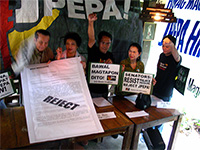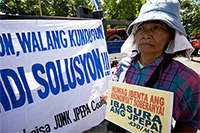NO FOOD, NO JOBS, NO FUTURE with JPEPA
Groups Critical of Malacañang’s Moves to Ratify Accord
Press Release
 |
 |
 |
 |
| |
 |
|
 |
 |
 |
| |
 |
|
 |
 |
 |
| |
 |
|
 |
 |
 |
| |
 |
|
| |
No Food, No Jobs, No Future with JPEPA.
Protesters in torn and tattered clothing, holding empty plates, and blindfolded are being led by a GMA mask wearing activist, depicting the hardship and poverty the Filipino nation will suffer if JPEPA is ratified. The protesters were also critical of Malacañang’s motives for aggressively pushing for the ratification of the bilateral accord with Japan.
Images ©Gigie Cruz
|
|
 |
 |
 |
|
| |
21 April 2008 (Pasay City, Philippines) – Coming at the heels of the rice shortage crisis, the Spratly’s controversy, and NBN-ZTE kickback scandal, various people’s movement again renewed their campaign against the Japan-Philippines Economic Partnership Agreement or JPEPA in front of the Senate as the legislative body convened to renew its session. Over 500 members of the Magkaisa Junk JPEPA Coalition (MJJC) greeted the opening day of the Senate to support the Senate in its continued assertion of independence from Malacañang pressures to quickly ratify JPEPA and to urge the Senate to weigh the harmful repercussions JPEPA will deal to the Philippines if ratified.
“This is the same government, led by President Arroyo that is involved in the ZTE and Spratlys scandal. With this spotty track record, here again is President Arroyo bullying the Senate into ratifying JPEPA in spite of her government’s failure to show that JPEPA will benefit the Filipinos,” exclaimed Arze Glipo, lead convenor of Task Force Food Sovereignty, a member group of the MJJC. “President Arroyo can not blame the Senate or the people for rising up against JPEPA. She only has herself and her minions to blame, and they ought to be held accountable for their actions.”
No Food for Filipinos
In their brief on JPEPA’s impact on agriculture, the Task Force Food Sovereignty (TFFS) stated that much of the trumpeted JPEPA gains are imaginary, but the losses are real in terms of job displacement and worsened poverty for rural people who will be driven away from their land and natural resources. The group further argues that the JPEPA’s text allows the full entry of Japanese multinational companies in crop plantations, fishery, mining, power, etc, depriving the Filipinos the prior right and access to their land and other productive resources.
TFFS contention of job losses in the agricultural sector is in line with one of the conclusions arrived at by the Philippine Institute for Development Studies (PIDS) when it studied JPEPA. According to PIDS there is a clear conclusion that JPEPA threatens the Constitutional mandate for sound agricultural development, and there will be a contraction of the agricultural sector if JPEPA is ratified and will cause an increase in unemployment in the agricultural sector.
“The Senate cannot ignore the impacts of JPEPA to the basic food producing sectors,” stated Ms. Glipo.
No Jobs for Filipinos
In addition to the loss of jobs in the agricultural sector, the JPEPA’s axe poses a serious threat to the 77,000 Filipino workers of the automobile industry. The JPEPA will open the floodgates to imported used four-wheeled motor vehicles despite the existence of Executive Order 156 that clearly prohibits the same.
“If JPEPA passes in spite of these clear threats to Filipino jobs, it will only worsen the jobless growth we have been experiencing under Pres. Arroyo’s regime,” exclaimed Josua Mata, Secretary General of the Alliance for Progressive Labor, another coalition partner of MJJC. “The supremacy of Japanese interests in JPEPA, and not the interests of the Filipino people has totally eroded any shred of JPEPA's presumed political and economic ascendancy.”
No Future for Filipinos
JPEPA disregards the basic contract between the government and the Filipino people. Unbiased and respected legal experts, such as Retired Justice Florentino P. Feliciano have unequivocably opined that the JPEPA is unconstitutional. No less than Senator Miriam Santiago, agreed to Justice Feliciano’s conclusion when she spoke to the press after the Senate hearing on the Constitutionality of JPEPA, “It (Jpepa) will be declared unconstitutional by the Supreme Court. That is my humble opinion as a scholar of constitutional law.”
As if the issue of unconstitutionality is not enough, JPEPA’s threatens the Philippine environment as well, since the entry of toxic wastes, and other banned or controlled substances such as ozone depleting substances, chemicals that are attributed to climate change, persistent organic pollutants, such as the cancer causing PCBs, and nuclear wastes are facilitated, promoted, and protected under JPEPA.
The Senate Fights Back
Recently, Sen. Pia Cayetano cited Malacañang for its tactics. Senator Cayetano said in an interview that “President Arroyo should not be pressuring the Senate to ratify JPEPA…Anyone attending the hearings on JPEPA would have concluded the agreement has so many loopholes and the government panel failed miserably to secure terms favorable to Filipinos.”
Joining the push-back against Malacañang, Senator Nene Pimentel chimed that “The senators will decide on the trade agreement based on its (JPEPA) benefits on the Filipinos and not because they [senators] just want to please the Palace."
The Coming Storm
The JPEPA controversy has been over a year in the making. Its final bell might come immediately after April 28, when Senators Miriam Defensor Santiago and Mar Roxas III release their joint committee report on the JPEPA, and the Senate begins to deliberate and then finally vote on the accord.
“JPEPA is riddled with so many constitutional, legal, economic and environmental flaws that the government needs to prop it up with hollow assurances of “side agreements,” “safety nets,” and “conditional concurrences”, explains Dr. Angelina Galang, Coordinator of Green Convergence. “Individually and in unity, we must reject frameworks such as JPEPA that are skewed to favor foreign interests, are prone to corruption, ignore ecological harm, widen economic disparities, and deprive citizens of their right to real participation in developmental decision-making and actions in their own localities.”
End
For more details:
Ms. Arze Glipo, Task Force Food Sovereignty, mobile: 0917 857 6203.
Mr. Josua Mata, Alliance of Progressive Labor, mobile: 0917 794 2431.
Dr. Angelina P. Galang, Green Convergence, mobile: 0917 853 8841; email address: agalang@mc.edu.ph
FAIR USE NOTICE. This document contains copyrighted material whose use has not been specifically authorized by the copyright owner. The Basel Action Network is making this article available in our efforts to advance understanding of ecological sustainability and environmental justice issues. We believe that this constitutes a 'fair use' of the copyrighted material as provided for in section 107 of the US Copyright Law. If you wish to use this copyrighted material for purposes of your own that go beyond 'fair use', you must obtain permission from the copyright owner.
More News
|